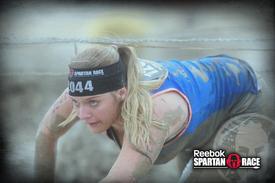Weight lifting question

wells0707
Posts: 251 Member
So, I am new to the whole lifting weights aspect of working out. I know how many extra calories to eat when I am doing cardio, but I am not sure how to adjust my eating habits on weight lifting days.
I would love some advice from anyone who is successfully losing weight while weight lifting as to how to change my diet on those days. I am doing about an hour of weight lifting roughly every few days.
Thanks
I would love some advice from anyone who is successfully losing weight while weight lifting as to how to change my diet on those days. I am doing about an hour of weight lifting roughly every few days.
Thanks
0
Replies
-
Some people list weight lifting as cardio and then eat back HUGE amounts of calories (most of them stall). I do not suggest this.
Instead, weight lifting requires more protein. So, just adjust your diet to reflect the needed protein.0 -
So..for example...Lets say my daily calories are set at 1300 pre workout. Are you saying not to increase calories, but to fit more protein inside of the set limit?0
-
Bingo.
Most of weight lifting is spent doing nothing. You lift for a few seconds, then wait and wait then lift a few seconds more.
Cardio on the other hand, you're actively moving the entire time. That burns.
You do burn SOME calories during weight training, but its not nearly as large as people seem to assume.
You can manually set your goals to change daily protein intake to 25% of your calories, maybe even 30%. That should do it for you.0 -
Bingo.
Most of weight lifting is spent doing nothing. You lift for a few seconds, then wait and wait then lift a few seconds more.
Cardio on the other hand, you're actively moving the entire time. That burns.
You do burn SOME calories during weight training, but its not nearly as large as people seem to assume.
You can manually set your goals to change daily protein intake to 25% of your calories, maybe even 30%. That should do it for you.
First off, the assumption that most of the time you're doing "nothing" while lifting weights is a joke. It may appear that I'm not doing anything between sets, but believe me- most of the time my heart rate is jacked, my breathing is heavy and I'm sweating like a pig.
Second, numerous studies have shown that weight lifting produces a longer calorie burn than standard cardio. This means that even after you finish your workout, you continue to burn calories. Conversely, when you end a standard session of cardio, you also end your calorie burn. Additonally, HIIT-style cardio has also been shown to produce a longer, post-exercise calorie burn as well.0 -
First off, the assumption that most of the time you're doing "nothing" while lifting weights is a joke. It may appear that I'm not doing anything between sets, but believe me- most of the time my heart rate is jacked, my breathing is heavy and I'm sweating like a pig.
Second, numerous studies have shown that weight lifting produces a longer calorie burn than standard cardio. This means that even after you finish your workout, you continue to burn calories. Conversely, when you end a standard session of cardio, you also end your calorie burn. Additonally, HIIT-style cardio has also been shown to produce a longer, post-exercise calorie burn as well.
Ah, numbers. I DO enjoy numbers. Simply elevating your heart rate does cause more burn than a lower heart rate, true. But the burn from weight lifting is not nearly as much as from cardio. So, the idea that you are sitting on the bench with a high heart rate staring at the wall and the pounds are shedding is a JOKE too. If this was totally true in the way you seem to think, all we'd have to do is watch suspense movies and lose weight faster than a marathon runner ever could.
HIIT does create a longer calorie burn than regular cardio yes. But the rate is lower and the overall caloric burn is not as high when all is said and done. HIIT has periods of high and then low intensity. This does create a state that the body will burn calories for a longer period of time, but due to the low intensity, it will not burn as much as a steady state cardio session.
Anyone that thinks they are burning more sitting on a bench waiting between sets than they do while running at a medium-high pace is simply fooling themselves.0 -
I would love to hear more opinions...the more information the better.0
-
Bingo.
Most of weight lifting is spent doing nothing. You lift for a few seconds, then wait and wait then lift a few seconds more.
Cardio on the other hand, you're actively moving the entire time. That burns.
You do burn SOME calories during weight training, but its not nearly as large as people seem to assume.
You can manually set your goals to change daily protein intake to 25% of your calories, maybe even 30%. That should do it for you.
First off, the assumption that most of the time you're doing "nothing" while lifting weights is a joke. It may appear that I'm not doing anything between sets, but believe me- most of the time my heart rate is jacked, my breathing is heavy and I'm sweating like a pig.
Second, numerous studies have shown that weight lifting produces a longer calorie burn than standard cardio. This means that even after you finish your workout, you continue to burn calories. Conversely, when you end a standard session of cardio, you also end your calorie burn. Additonally, HIIT-style cardio has also been shown to produce a longer, post-exercise calorie burn as well.
I agree with this guy in that if you're standing around doing nothing, you're not working hard enough. Often times I superset, so I am barely resting. I eat anywhere from 200-250 calories more on a heavy workout day, which usually consists of 30-40 minutes of weight training followed by 20 minutes of HIIT on the treadmill. I am not trying to lose though, I am maintaining.
I would say, at least 150-200 more on heavy weight lifting days, and more on the protein. A protein shake would be a perfect additional snack.0 -
Makes sense. Thanks0
-
Right now I am doing the new rules of weight lifting for women. I got the book on amazon.ca, It explains the rationale for how many calories you need when weight lifting and why. I would recommend buying it and reading it over. I follow the weightlifting plans it gives you too, and love it. I have only been doing it for two weeks, and I am only down two pounds, but I swear to you, I sweat from the moment I enter the gym, till when I get home, and according to my HRM by pulse is always above 150 bpm. The book may be helpful to you too. Good luck!0
-
Don't want to get into a debate so I will tell you my experience. I wear a HRM so I know pretty close to what I am burning. I burn around 300-400 calories heavy lifting when I am training on my own. Now with my trainer I burn around 600-700 because there is no rest at all, he constantly watches my monitor to keep heart rate elevated. He will make me sprint, jump jacks, or something to keep me elevated to get the burn.
I was doing a 1200 calorie diet everyday, but I increased to 1500 diet and I FEEL SO MUCH BETTER. I was so tired and worn out for months and thought it was from training. It was simply me not eating enough.
Everyone is different but I eat a high protein snack such as cottage cheese and fruit or greek yogurt, etc about an hour or so before I go work out. It keeps me energized and my insulin levels don't flucuate much. (I tried the shakes but when moving around I feel like I will hurl). I would say try eating a high protein snack before you go workout, but you can't do it while pulling up at gym, your body has to have some time to process it to keep the fatigued feeling away.
Ideally protein should be between 1-1.5g per lean body weight.0 -
I don't log my weight lifting calories as I am so small and can't push around all that much weight anyway, it really doesn't make a dent in my program.
I have bumped up my protein intake to assist with recovery, but it is going to be a while before I can even bench press the bar, much less put any weight on that bar. That's why I don't count my weight training days--not enough work to count.
My husband does count his weight lifting days, but he has some pretty substantial muscle mass. He I can see that he is working hard and he breaks a pretty good sweat. When I get to that stage, I will begin counting my weight lifting days in my calorie counts.
Hopefully those days aren't too far away.0 -
I eat a cut from my TDEE. I know my burns from weight lifting from my HRM and trial and error with calorie intake. I also stopped focusing on losing lbs and focused more on losing inches and BF%. The scale has been a flat out liar on my success since I've been lifting.0
-
bump for later0
-
So, I am new to the whole lifting weights aspect of working out. I know how many extra calories to eat when I am doing cardio, but I am not sure how to adjust my eating habits on weight lifting days.
It's pretty subjective and depends on your intensity, weight amount, and rest periods. My advice is to have an extra protein shake after your lifting session and don't log extra calories unless you want to just add in the protein shake calories as the amount burned. If you stall or lose too quickly then just adjust as necessary. Don't stress over the number of calories burned from strength training. Just do it.0 -
1. Mantaining muscle requires more calories than maintining fat. Thus, as you get more muscle, you shoudl adjust upward your 1,300 daily calorie requirements.
2. After weight taining, protein is important. You can't get protein without some additional calories.
3. Easy weight training does not require much effort. I see lots of women training in the gym chatting up a trainer and doing almost nothing. I'm sure they go home and said they worked out.
4. Traing hard with weights burns lots of claories and you should adjust accordingly.
All of you are right . . . just depends on whether you are a chatty or serious weight trainer.0 -
Personal opinion. If your lifting weights and not getting anything kind of exertion out of it, even with rest in between, your not challenging yourself regardless of your current state of muscle mass. Your goals matter too. I've been through mass gain phases and cutting phases. I don't use MFP to track food because its not flexible enough for me but I eat around my lifting days. I've always burned through my energy stores during lifting days eating at any kinda of deficit to the effect I had to do heavy carb loading to make it through some of my workouts.0
-
Bingo.
Most of weight lifting is spent doing nothing. You lift for a few seconds, then wait and wait then lift a few seconds more.
Ridiculous. Maybe for you. Don't lump the rest of us in this.0 -
First off, the assumption that most of the time you're doing "nothing" while lifting weights is a joke. It may appear that I'm not doing anything between sets, but believe me- most of the time my heart rate is jacked, my breathing is heavy and I'm sweating like a pig.
Same here. I guess it depends on how much your giving. Only time I'm not sweating is when they have the AC and fans on full blast but I still breath heavy exhausted.0 -
When I started doing weight days, I kept it simple and logged it under "Strength Training" in the cardio database on MFP. The calorie counts come out much lower than cardio (as they should), and that was good enough for me. I also eat back all my exercise calories most days, so I didn't wanna go way over...
Hope this helps!0 -
You might want to read this article: http://www.acaloriecounter.com/diet/
I read it and I understand more about gaining muscle then I ever did before.
A side note though the way how he calculates how much calories you need a day(finds maintenance level then adds 250 to 500 calories for muscle gain for a man) vs MFP is different. If you use his option 2(the one with the calculator).
The one he uses already factors in the calories you will burn but MFP seems to find your maintenance level and gives you more calories once you do exercise.
If you use MFP to log the your calories I would leave it with the number they choose(when you change your goal to gain weight). I would use the articles number to give you an idea of how many calories you will need in a day you work out.0 -
Don't want to get into a debate so I will tell you my experience. I wear a HRM so I know pretty close to what I am burning. I burn around 300-400 calories heavy lifting when I am training on my own. Now with my trainer I burn around 600-700 because there is no rest at all, he constantly watches my monitor to keep heart rate elevated. He will make me sprint, jump jacks, or something to keep me elevated to get the burn.
HRMs are useless for strength training. They are specifically designed for steady state cardio.0 -
When I started doing weight days, I kept it simple and logged it under "Strength Training" in the cardio database on MFP. The calorie counts come out much lower than cardio (as they should), and that was good enough for me. I also eat back all my exercise calories most days, so I didn't wanna go way over...
Hope this helps!
This is a fine way to account for it. You will also get increased post-exercise burn but not worth trying to account for unless you are trying to either gain or maintain.0 -
Usually rigorous weightlifting for an hour uses anywhere from 200 to 350 calories during the workout itself not including afterburn so my advice would be to get a little extra carbs in about an hour or so prior to lifting for energy and your protein really doesn't need to change if your still taking in .8 grams per pound of body weight whether or not cardio or lifting protein should stay the same. Hope this helps!
Jesse Short
ISSA Certified Personal Trainer0 -
As already pointed out - calorie burn while lifting is dependent a lot on what your work/rest routine is.
I wear a stopwatch the whole time. 1 minute between sets, 2 minutes between exercises. So my heart rate never really drops down to a resting rate. If you're gonna do a set then wait 5 minutes before the next, you're not going to burn as much.0 -
First off, the assumption that most of the time you're doing "nothing" while lifting weights is a joke. It may appear that I'm not doing anything between sets, but believe me- most of the time my heart rate is jacked, my breathing is heavy and I'm sweating like a pig.
Second, numerous studies have shown that weight lifting produces a longer calorie burn than standard cardio. This means that even after you finish your workout, you continue to burn calories. Conversely, when you end a standard session of cardio, you also end your calorie burn. Additonally, HIIT-style cardio has also been shown to produce a longer, post-exercise calorie burn as well.
Ah, numbers. I DO enjoy numbers. Simply elevating your heart rate does cause more burn than a lower heart rate, true. But the burn from weight lifting is not nearly as much as from cardio. So, the idea that you are sitting on the bench with a high heart rate staring at the wall and the pounds are shedding is a JOKE too. If this was totally true in the way you seem to think, all we'd have to do is watch suspense movies and lose weight faster than a marathon runner ever could.
HIIT does create a longer calorie burn than regular cardio yes. But the rate is lower and the overall caloric burn is not as high when all is said and done. HIIT has periods of high and then low intensity. This does create a state that the body will burn calories for a longer period of time, but due to the low intensity, it will not burn as much as a steady state cardio session.
Anyone that thinks they are burning more sitting on a bench waiting between sets than they do while running at a medium-high pace is simply fooling themselves.
Sorry to be judgmental but where do you have the proof to back up your thoughts? Judging by your pictures you do not lift much. I know this may sound harsh but its an honest question?0 -
HIIT does create a longer calorie burn than regular cardio yes. But the rate is lower and the overall caloric burn is not as high when all is said and done. HIIT has periods of high and then low intensity. This does create a state that the body will burn calories for a longer period of time, but due to the low intensity, it will not burn as much as a steady state cardio session.
.
Kind of off track in this thread but I remember reading a Lyle McDonald article saying they were pretty much the same depending on the time expended for both. The article was essentially saying that HIIT is not better than steady state. I think the comparison was 20 minutes HIIT and 45 minutes steady state has essentialy the same burn in 24 hours period taking EPOC into account. Do you have different data?0 -
I have had good results using MFP calculations under the Cardio/stength training section. For me the estimations have been low but I feel they are accurate. For reference MFP gives me 219 cals/hour. I put in the actual time I was at the gym including time between sets and eat back what it gives me.
You can adjust your calorie intake anytime you want if you are not getting the results you are looking for. I would recommend giving any changes a couple of weeks before deciding if its working or not though.
Personally I do not lift weights for the calories burn and dont try to turn my lifting into cardio or endurance training. Lift weights to stimulate the muscles for growth, strength and/or retention.0 -
As already pointed out - calorie burn while lifting is dependent a lot on what your work/rest routine is.
I wear a stopwatch the whole time. 1 minute between sets, 2 minutes between exercises. So my heart rate never really drops down to a resting rate. If you're gonna do a set then wait 5 minutes before the next, you're not going to burn as much.
You also may not get as much out of each set and challenge the muscles enough if you don't rest at least 3 minutes between sets. This allows time for full recovery of the ATP-PC energy system for the next set and enables you to lift more with greater intensity. So much of the benefit of lifting has nothing to do with heart rate. If you are doing muscular enderance training, what you've said applies but not for strength traiining.0 -
Bingo.
Most of weight lifting is spent doing nothing. You lift for a few seconds, then wait and wait then lift a few seconds more.
Cardio on the other hand, you're actively moving the entire time. That burns.
You do burn SOME calories during weight training, but its not nearly as large as people seem to assume.
You can manually set your goals to change daily protein intake to 25% of your calories, maybe even 30%. That should do it for you.
No offence but i'd say this is rubbish.
If I am lifting I make sure I get a post workout meal in (within an hour) - this includes protein & carbs (mostly simple carbs), for energy to transport the protein.
You can have a nosy at my diary if you like - I go to the gym at 7am, so my postworkout meal is 'elevenses'.
I'm in no way an expert on nutririon but i'd also consider changing your macro %s. IMO, MFP sets the carbs pretty high. I was doing 40/30/30 but I'm trying out 35/35/30 at the moment.
Hope this helps.
Oh, and you can log 'Strength Training' in Cardio so you get a calorie value 0
0 -
When I started doing weight days, I kept it simple and logged it under "Strength Training" in the cardio database on MFP. The calorie counts come out much lower than cardio (as they should), and that was good enough for me. I also eat back all my exercise calories most days, so I didn't wanna go way over...
Hope this helps!
This is a fine way to account for it. You will also get increased post-exercise burn but not worth trying to account for unless you are trying to either gain or maintain.
Agreed.0
This discussion has been closed.
Categories
- All Categories
- 1.4M Health, Wellness and Goals
- 398.4K Introduce Yourself
- 44.7K Getting Started
- 261K Health and Weight Loss
- 176.4K Food and Nutrition
- 47.7K Recipes
- 233K Fitness and Exercise
- 462 Sleep, Mindfulness and Overall Wellness
- 6.5K Goal: Maintaining Weight
- 8.7K Goal: Gaining Weight and Body Building
- 153.5K Motivation and Support
- 8.4K Challenges
- 1.4K Debate Club
- 96.5K Chit-Chat
- 2.6K Fun and Games
- 4.7K MyFitnessPal Information
- 17 News and Announcements
- 21 MyFitnessPal Academy
- 1.5K Feature Suggestions and Ideas
- 3.2K MyFitnessPal Tech Support Questions

















